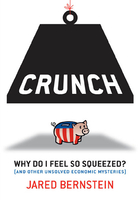
Introduction: So What Is Economics, Anyway?
So a doctor tells this unfortunate woman that she has but six months to live. “Isn’t there anything I can do?” she pleads. “Marry an economist,” the doctor replies. “It won’t cure the illness, but it will make the six months seem like five years.”
We might as well start with the basics, and I promise this won’t take anywhere near six months.
I recently completed my toughest speaking gig of the year: I taught an economics lesson to my first-grader’s class. The goal was to teach them the fundamental concepts of needs versus wants, goods versus services, and scarcity. These distinctions are critical, because a good working definition of economics is the following:
The economy is the way we organize our society to best provide the goods and services that we need and want. Economics studies the best ways to do this.
They quickly got the needs/wants distinction, but they raised some fascinating questions. They got that housing is a need. But someone then asked, “What about a mansion?” (Just to be sure, I asked them if they knew what a mansion was. “A big house with lots of cobwebs,” they said.) They discussed that and determined that a mansion is a “want,” not a need. Smart kids, I thought.
Anyway, all I’m saying is that anybody of any age can get this stuff. In fact, to not get it, to give up because it’s too obscure, is, as I will show, a profoundly important political act, one with damaging consequences. The stakes are high, for ourselves and for those who come after us—too high to entrust to those whose agenda is to redistribute power and resources to themselves and their friends.
Am I really suggesting that evil people disguised as social scientists are out to rob us blind while we willingly sign on the dotted line because we don’t get the math?
No, not at all, though many powerful political and corporate actors use economists and economic (il)logic to do just that.
It’s just that there are countless ways to organize our society to “best provide the goods and services that we need and want.” In other advanced economies—in those of Europe, Canada, Scandinavia—they answer this question quite differently from the way we do. For example, they take access to health care services “out of the market,” based on the beliefs (a) that health care is a basic right in an advanced society, and (b) as discussed in some detail later, that there are special attributes of health care that make unregulated markets a particularly inefficient (read: wasteful) way to deliver and provide it. And you don’t have to get on a plane to learn the lesson that there are different ways to organize the economy. In other periods within our own history, we organized things differently, too.
This question of how we organize the economy matters a lot. It determines how the benefits of growth are distributed. Even more important, it determines who gets the opportunity to realize their potential. If the best educational opportunities go to the haves, their position relative to the have-nots will become etched in stone, as economic mobility atrophies. If those in political power believe—and act on the belief—that labor standards, like minimum wages, overtime, or the right to collectively bargain, are harmful to economic growth, then the ability of some workers to bargain for their fair share of the growing economy will evaporate while that of others grows stronger. How we organize our economy determines how we structure our response to the challenges from environmental degradation, globalization, the lack of health coverage, and staggering wealth inequalities.
When answering the questions that follow, three unifying principles kept coming up. I’ll come back to these often, as I found them to be useful navigational tools, providing the intellectual and moral guideposts needed to keep us moving in the right direction—toward an economy that works best for all.
BASICPRINCIPLES OF CRUNCH-STYLE ECONOMICS
1. Economic outcomes are generally thought to be fair, in the sense that market forces dole out rewards to those who merit them. But that’s not always the case. Power, whether it’s based on political clout, wealth, class, race, or gender, is also a key determinant of who gets what.
2.Economic relationships often play out in surprising ways, contradicting both basic logic and textbook theory. The path to economic truth is paved with evidence, not assumptions.
3. Since economics is concerned with finite resources, economic decisions often invoke trade-offs: choosing one outcome over another. Though these trade-offs are usually thought of as the benign outcomes of rational discourse, it’s not so: See #1.
As I hope these principles suggest to you, the goal of this book is not simply to help readers become better versed in economic discourse, though that’s part of my goal. It’s also to offer a new way to answer the question, how can we best organize our society to provide the things we want and need? America is a democracy, and in a democracy we all get to weigh in on biggies like this, not just the elites and their scholarly shock troops.
With that in mind, let’s get to work.
Crunchpoint :* Economics is not an objective, scientific discipline. It is a set of decisions about how to produce and distribute resources and opportunities. Understanding and evaluating the logic and rationales for those decisions, while recognizing whom those decisions favor or exclude, is a big part of what this book is about. To proceed with these insights foremost in our minds is the only way I know to rechannel the power of economic analysis back to the service of those who need it most: the ones in the vise grip of the crunch.
* Each question and chapter in the book ends with a “crunchpoint,” an allegedly snappy summary of the discussion.